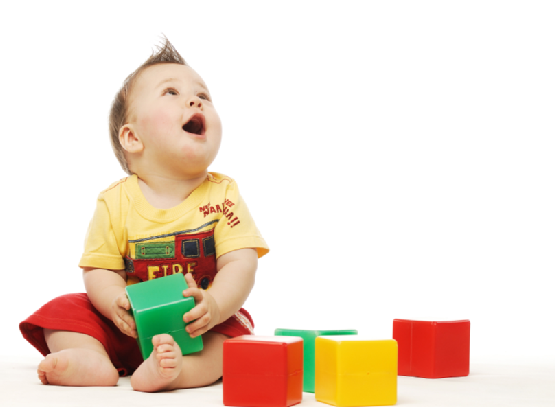Most infants respond to a game of peek-a-boo with smiles at the very least, and, for those who find the activity particularly entertaining, gales of laughter. For infants with autism spectrum disorders (ASD), however, the game can be distressing rather than pleasant, and they’ll do their best to tune out all aspects of it — and that includes the people playing with them.
That disengagement is a hallmark of ASD, and one of the characteristics that amplifies the disorder as infants develop into children and then adults.

A study conducted by researchers at the Koegel Autism Center at UC Santa Barbara has found that replacing such games in favor of those the infant prefers can actually lessen the severity of the infants’ ASD symptoms, and, perhaps, alleviate the condition altogether. Their work is highlighted the current issue of the Journal of Positive Behavioral Interventions .
Lynn Koegel, clinical director of the center and the study’s lead author, described the game-playing protocol as a modified Pivotal Response Treatment (PVT). Developed at UCSB, PRT is based on principles of positive motivation. The researchers identified the activities that seemed to be more enjoyable to the infants and taught the respective parents to focus on those rather than on the typical games they might otherwise choose. “We had them play with their infants for short periods, and then give them some kind of social reward,” Koegel said. “Over time, we conditioned the infants to enjoy all the activities that were presented by pairing the less desired activities with the highly desired ones.” The social reward is preferable to, say, a toy, Koegel noted, because it maintains the ever-crucial personal interaction.
“The idea is to get them more interested in people,” she continued, “to focus on their socialization. If they’re avoiding people and avoiding interacting, that creates a whole host of other issues. They don’t form friendships, and then they don’t get the social feedback that comes from interacting with friends.”
According to Koegel, by the end of the relatively short one- to three-month intervention period, which included teaching the parents how to implement the procedures, all the infants in the study had normal reactions to stimuli. “Two of the three have no disabilities at all, and the third is very social,” she said. “The third does have a language delay, but that’s more manageable than some of the other issues.”
On a large scale, Koegel hopes to establish some benchmark for identifying social deficits in infants so parents and health care providers can intervene sooner rather than later. “We have a grant from the Autism Science Foundation to look at lots of babies and try to really figure out which signs are red flags, and which aren’t,” she said. “A number of the infants who show signs of autism will turn out to be perfectly fine; but we’re saying, let’s not take the risk if we can put an intervention in play that really works. Then we don’t have to worry about whether or not these kids would develop the full-blown symptoms of autism.”
Historically, ASD is diagnosed in children 18 months or older, and treatment generally begins around 4 years. “You can pretty reliably diagnose kids at 18 months, especially the more severe cases,” said Koegel. “The mild cases might be a little harder, especially if the child has some verbal communication. There are a few measures — like the ones we used in our study — that can diagnose kids pre-language, even as young as six months. But ours was the first that worked with children under 12 months and found an effective intervention.”
Given the increasing number of children being diagnosed with ASD, Koegel’s findings could be life altering — literally. “When you consider that the recommended intervention for preschoolers with autism is 30 to 40 hours per week of one-on-one therapy, this is a fairly easy fix,” she said. “We did a single one-hour session per week for four to 12 weeks until the symptoms improved, and some of these infants were only a few months old. We saw a lot of positive change.”
At The Behavior Exchange of Dallas, our highly trained and caring staff are dedicated to the belief that what could be, can be. Our intensive work involves the family, schools, and other professionals, and our mission requires patience, focus, and expertise. To learn more about our use of applied behavior analysis to bring out your child’s full potential, call (972)312-8733 today.
